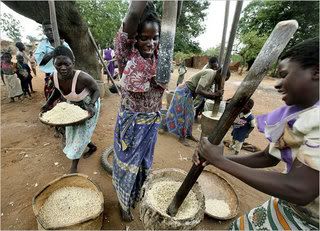"We will never again kneel down for food aid" - Malawi's Mutharika

By ignoring international experts, Malawi decided to support its own local farmers instead of importing food from Europe and America, and instead of being dependent on the World Food Program's handouts. It did so by improving access to fertilizers to its own large rural population. With great success. In one season's time, Malawi turned from a begging bowl into a major net food exporter, sending hundreds of thousands of tonnes to its food insecure neighbors Zimbabwe and Zambia. It repeated the leap forward last year (previous post).
Critics may call Malawi's super harvests a matter of luck. But guess what? This year too, it again expects a third bumper maize harvest. Three times in a row - that isn't luck, that is policy.
Acting on the good news, Malawian President Bingu wa Mutharika, who is credited with the smart policy and who is also Minister of Agriculture, vowed he would never again "kneel down" for food aid.
I will not, as your president, ever again kneel down in front of the donor communities to ask for maize. Please don't allow me to do that.Because of the smart, simple fertiliser program, Malawi met its food needs in 2006 for the first time in seven years with a harvest of 2.2 million tons. About 45 percent of Malawians live below the poverty line and on less than a dollar a day. The vast majority of the poor are farmers.
We can ask for other assistance, but maize, for goodness sake, we can grow all the maize we want.
It's amazing the vast valleys which we can reclaim and grow all the food we want. Why do we suffer? We have valleys everywhere. Why do we Malawians have to suffer and ask for food somewhere else? - Bingu wa Mutharika
The Malawian example offers hope for Africa and can be replicated across the continent, but many barriers remain: the food aid industry (which is a form of subsidy to producers in Europe and the US), trade barriers, high oil prices, subsidies in the EU and the US, corrupt officials and local elites who prefer to ignore their own rural populations and deal with wealthy Euro-American food producers instead... all these destructive forces must be tackled. Then Africa is ready to make its Green Revolution. Then, at last, it can begin to produce the vast amounts of food and biofuels analysts know can be produced there.
The intention to "never again kneel down" in front of the food aid industry, is a good start [entry ends here].
 biomass :: bioenergy :: biofuels :: energy :: sustainability :: agriculture :: food :: food aid :: hunger :: Green Revolution :: Africa ::
biomass :: bioenergy :: biofuels :: energy :: sustainability :: agriculture :: food :: food aid :: hunger :: Green Revolution :: Africa ::  --------------
--------------
 At the 148th Meeting of the OPEC Conference, the oil exporting cartel decided to leave its production level unchanged, sending crude prices spiralling to new records (above $104). OPEC "observed that the market is well-supplied, with current commercial oil stocks standing above their five-year average. The Conference further noted, with concern, that the current price environment does not reflect market fundamentals, as crude oil prices are being strongly influenced by the weakness in the US dollar, rising inflation and significant flow of funds into the commodities market."
At the 148th Meeting of the OPEC Conference, the oil exporting cartel decided to leave its production level unchanged, sending crude prices spiralling to new records (above $104). OPEC "observed that the market is well-supplied, with current commercial oil stocks standing above their five-year average. The Conference further noted, with concern, that the current price environment does not reflect market fundamentals, as crude oil prices are being strongly influenced by the weakness in the US dollar, rising inflation and significant flow of funds into the commodities market."









2 Comments:
It looks like Malawi has discovered a very advanced technology that Europe and the US explored some time during the 19th century:
- Functioning government that actually cares about its people.
Now, this is a new idea.
Indeed, what's going on in Malawi could be revolutionary in its simplicity. But it is a fragile situation, and many forces want to destroy the gains because they are losing lucrative deals.
Good governance and basic investments in African farmers can turn the world upside down. It can be done, provided the big interests of local elites and Euro-American development organisations are ignored.
Post a Comment
Links to this post:
Create a Link
<< Home